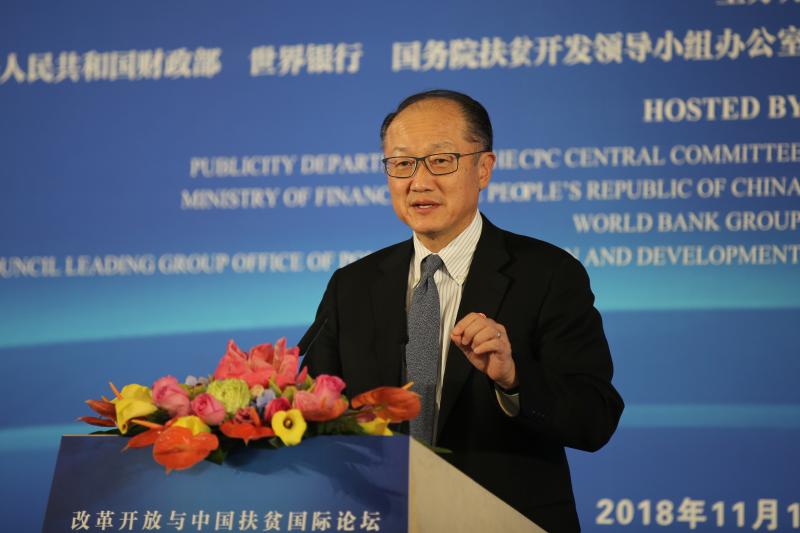WB President: China's poverty reduction experience deserves world attention
Chinagate.cn by Xu Lin,November 02, 2018 Adjust font size:
Jim Yong Kim, President of the World Bank Group, delivers a keynote speech at the International Forum on Reform and Opening Up and Poverty Reduction held in Beijing, on Nov. 1-2, 2018. [Photo by Wu Xiaoshan / China.org.cn]
Intro: 40 years' reform and opening up have made China the second largest economy in the world, and the country is now within striking distance of eliminating extreme poverty, said World Bank President Jim Yong Kim in Beijing on Thursday.
China's 40 years' reform and opening up has made it the second largest economy in the world, and the country is now within striking distance of eliminating extreme poverty, said the World Bank President Jim Yong Kim in Beijing on Thursday.
China has become "one of the few countries that will soon have made the journey from low-income country to high-income country," said Kim in his keynote speech at the International Forum on Reform and Opening Up and Poverty Reduction.
He noted that over the past four decades, more than 800 million people have escaped from poverty in China. The country’s share in the world economy has surged from 1.5 percent in 1978 to 15 percent today, and its per capita income increased 25-fold from US$300 in 1978 to US$7,300 in 2017.
China's reform and opening up program and a focused and sustained effort targeted at poverty reduction are the two major elements responsible for China's extraordinary success in reducing poverty, Kim stressed.
He also pointed out six key features to China’s poverty alleviation efforts that the world should learn from.
First, from very beginning, "poverty alleviation received strong political support form the highest levels of government," and "the strong leadership set the tone for all levels of government to pursue poverty alleviation in their locality or area of responsibility."
Second, China set up a dedicated organization, the State Council Leading Group Office of Poverty Alleviation and Development, to fight against poverty. The local poverty alleviation and development offices are also key actors in poverty reduction. "They have designed policies to combat poverty and implemented those plans under local circumstances."
Third, most of the poor lived or are still living in rural areas, so developing agriculture is a highly effective means of poverty alleviation. "For every 1 percent GDP growth, poverty declined by 0.97 percent between 1981 and 2017."
Fourth, China has targeted the poorest and most vulnerable groups, allocating them more resources. "In the past 5 years, 'Precision poverty targeting' based on a database of 70 million households is supporting the government in targeting the remaining poor in the Final Mile."
Fifth, rising inequality has become a concern for policymakers and the public. "In recent years, the bottom 40 percent of the population has gained more in income than the average. In the decade to 2012, consumption growth for the bottom 40 percent reached 8.1 percent per year, slightly higher than the national average of 7.9 percent."
Finally, China has focused on building human capital. The rapid expansion of compulsory education and tertiary education, the improvement in health insurance, and the reforms in health services have significantly improved equality in the labor force and the overall health of the general public.
Kim said that according to the first Human Capital Index - published recently by the World Bank - which measures the investment that countries make in the health and education of their people, China ranks 46, higher than most middle-income countries at the higher end, and closing in on levels achieved in OECD countries.
China is now a higher middle-income country and will soon be a high-income country. However, Kim also indicated that China's income level is only one quarter of that of the average OECD country, so it "still needs strong growth to achieve its two centennial goals". He noted that "China’s growth will have to rely increasingly on productivity increases and innovation."
This new direction requires further reform and opening up, Kim said. "Reforms will have to continue strengthening the institutions that will make China’s mixed economy work. And further opening up will not only provide China the markets it needs, but also the technology, managerial talent, and ideas to further catch up with more advanced countries."
With regard to China's international contribution, Kim observed that China’s increasing economic power makes it a more significant contributor to global growth. "The country has assumed leadership on key issues such as climate change and has been a strong voice for developing countries in international fora." China has also "assumed a leadership role in development finance" and become "a key promoter of using knowledge for development".
"Other countries are looking to China as a source of knowledge and experience, and the World Bank Group, which has been a committed partner to China for most of its reform journey, will continue to support China’s growing international role," Kim added.

